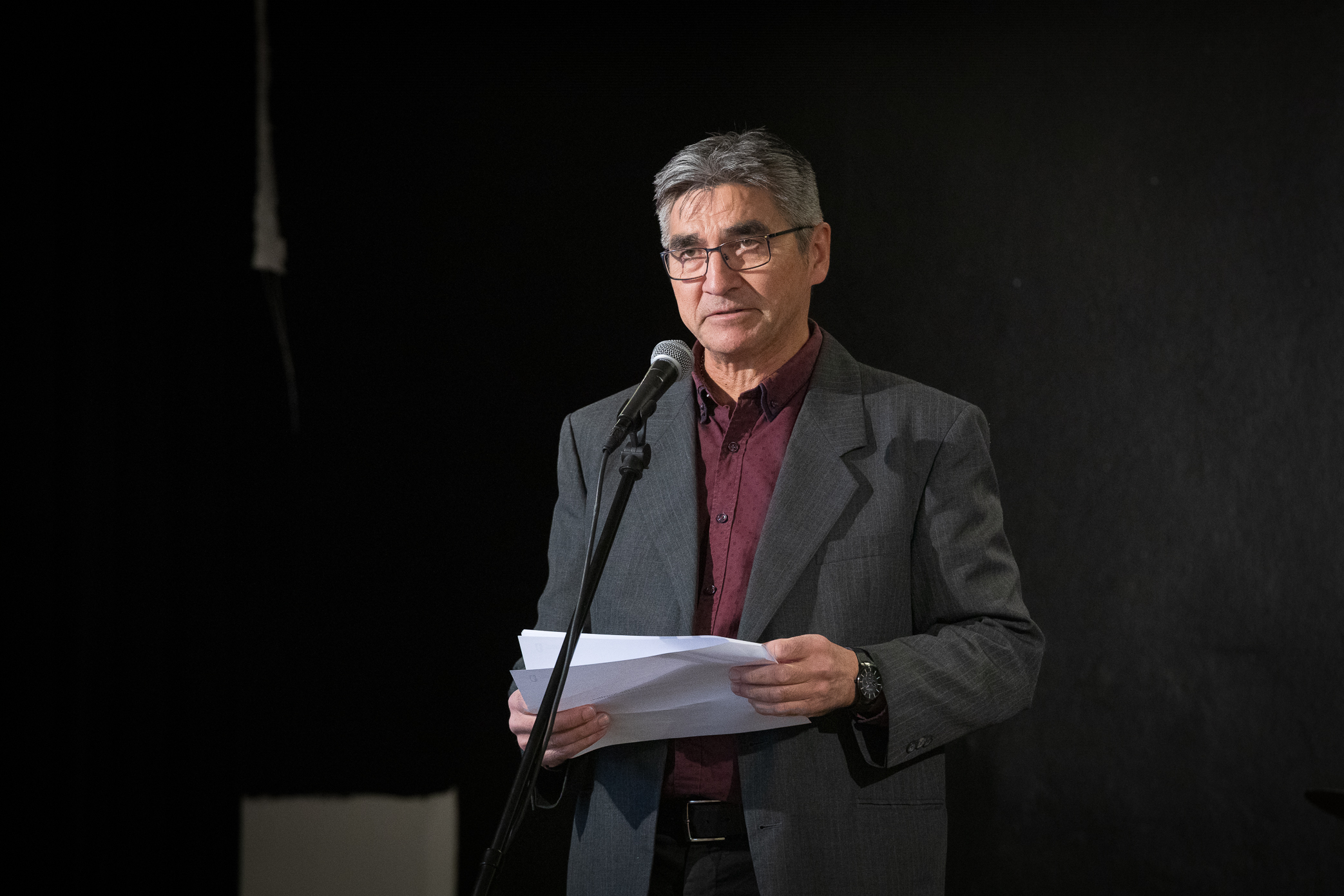Minister for landbrug, selvforsyning, energi og miljø Kalistat Lund (IA) var med som taler til Nuuk Nordisk Kulturfestival. Han mindede om, at naturen er større end os mennesker. Og at vi mennesker ødelægger vores planet, hvis vi undlader at handle. Kulturen giver os mulighed for at handle.
Nordisk Ministerråd havde d. 26. maj 2023 et arrangement under Nuuk Nordisk Kulturfestival med emnet ”Grøn omstilling i Norden: Kunst og kultur viser vejen?
I den forbindelse holdt minister for landbrug, selvforsyning, energi og miljø Kalistat Lund en tale, som fremhævede potentialet for at Grønland kan bidrage til den grønne omstilling i Norden – og Verden. Kunsten og kulturen er vigtige for at fremme den grønne omstilling.
I Nordisk Ministerråd vision 2030 er et grønt og bæredygtigt Norden blandt målene. Klima og bæredygtige løsninger er også højt på dagsordenen i Grønland, fordi vi mærker klimaforandringerne mere end andre steder på jorden.
Læs ministerens stærke tale herunder.
Obs. Talen er på engelsk.
Green transformation in the Nordics:
Kalistat Lund:
For me, Greenland is the land of aesthetics.
Many are left feeling amazed when they find themselves in our country’s magnificent nature.
It can literally take your breath away when you are in the rugged mountains and smell the pristine nature. And when moving between the huge ice floes in the deep fjords.
In nature, you can be struck by the same feeling as when a song deeply moves you. By a painting. A poem. A novel. By art and culture.
It appeals to us, and it affects us.
Greenland’s nature holds transformative potential.
The power of our nature is enormous, and our hydropower can produce vast amounts of energy in much larger quantities than we need ourselves.
This green energy can instead contribute to other countries’ green transformation.
So, our powerful nature can contribute to the global green transformation and the global change we need to make in the coming years.
Just like our natural world, art has a powerful potential to transform and start a change.
Artists and cultural producers have been sources of inspiration for millennia.
They create movement in and touch communities.
They can influence how we choose to live our lives.
We have many Greenlandic artists who make themselves heard through their art to us politicians and decision-makers.
Through their individual stories, they affect us.
They mobilise action and create a desire for change.
Not just politicians but everyone in society.
And change and action are needed.
Today, we are all in the eye of the hurricane.
We as human beings have caused the greatest crises of our time.
Here in the Arctic, we see and feel global warming and climate change more than anywhere else on Earth. And at a speed four times faster than the rest of the planet.
Global warming is causing both the ice sheet and sea ice to melt.
This has far-reaching consequences for the animals that live here, which are highly dependent on a climate with large amounts of ice and snow.
The extinction of nature and the planet’s species should concern us all because nature and our species define us as a country, our art, our culture, what we consume, and our lives.
In Greenland, our culture has always been built on strong storytelling.
As children, we were told that souls could wander from human to animal as to other livings, and this resulted in many creative stories.
What most stories have in common is that we must realise that we cannot – or should not – control nature.
Through wonderful stories, such as Mother of the Sea, we realise that we are governed by nature.
Throughout industrialisation, much of the world believed it was the other way around: That nature is governed by us humans.
I know, this is not the case.
The current crisis illustrates this very clearly, and it upsets the fundamental sense of self in many societies.
However, not for those of us living here in the Arctic.
Here in the Arctic, we have interacted with nature for millennia, fueled by storytelling, art, and cultural understanding, and it has taught us that humans must submit to nature.
And in the future, art and culture will continue to play a unique role in maintaining that we must continue to submit to nature.
Our political system is deeply dependent on art – in all its forms and shades.
“Siunissami inuusussat puigornagit.”
“Don’t forget those who will live in the future.”
This is what Rasmus Lyberth sings in “Inuunerup oqarfigaanga”.
Art doesn’t disappear.
But our species, plants, and planet will disappear if we don’t act.
Let us not forget about future generations. So, keep making your voice heard.
Crises require political action.
Crises need artistic action.
Crises require action from everyone.
Qujanaq.
Gik du glip af disse nyheder?
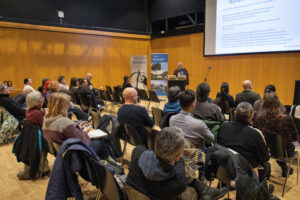
Video: Se eller gense informationsaften
NAPA holdt onsdag den 21. januar en informationsaften i Katuaq, hvor kunst- og kultur fonde havde oplæg om deres tilskudsprogrammer. Informationsaftenen blev streamet og optaget på Youtube, som kan ses på nedenfor. Oplægsholderne var NunaFonden, Den Grønlandske Fond, EU Repræsentationen i Nuuk, NAPA og Eqqumiitsuliornermut
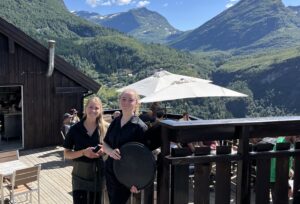
Søg sæsonjob i hele Norden med Nordjobb!
Er du mellem 18 og 30 år? Kan du forestille dig, at du arbejder på en gård i Island, i et cafeteria i Norge eller som receptionist på Færøerne? Eller måske som fotoguide i finsk Lapland? Med Nordjobb kan du søge sæsonjob i hele Norden.
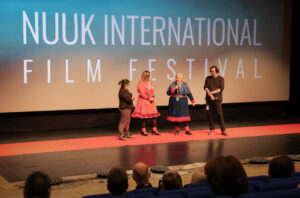
Nuuk International Film Festival – tak for denne gang!
Den niende udgave af Nuuk International Film Festival (NIFF) er vel overstået, og vi sidder tilbage med en masse stærke indtryk fra film fra Grønland, Arktis og Norden. NAPA er stolte af at have været med til at støtte festivalen, som endnu en gang viste,
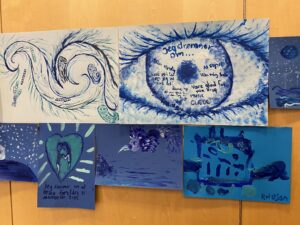
NAPA møder børn og unge i Diskobugten
NAPA rejser til Diskobugten i perioden fra den 3. juni til den 18. juni 2021. NAPA vil mødes med børn og unge samt lærere for at fortælle om deres nordiske muligheder samt lave drømmeworkshop på nogle af skolerne i Diskobugtens byer. Borgerne kan også møde




